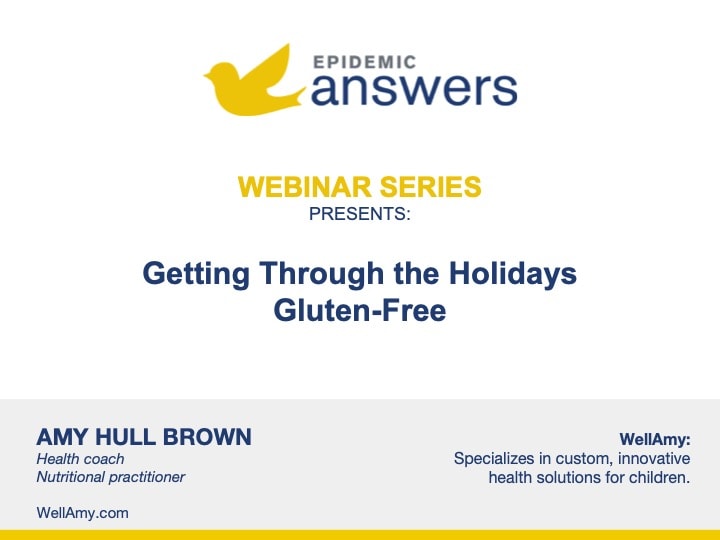The gluten free casein free diet can help children with autism, ADHD, SPD as well as those with asthma, allergies, autoimmune disorders and mood disorders improve their symptoms.
Originally, Lisa Lewis dug into diet literature looking for a way to help her son. She located the research of Paul Shattock and Karl Reichelt, who link gluten and casein with autism spectrum disorders. In 1998, she wrote “Special Diets for Special Kids”, sharing her findings with other families.
Later she co-founded the Autism Network for Dietary Intervention (ANDI) with Karen Seroussi, who popularized “the diet” further in her book, Unraveling the Mystery of Autism and Pervasive Developmental Disorder: A Mother’s Story of Research & Recovery.
These two courageous women have changed the lives of many families; others have joined their bandwagon. More and more companies now produce time-saving, quality, gluten-free, dairy-free, soy-free and yeast-free products.
Why Cut Out Gluten and Casein?
Gluten and casein are peptides that can contribute to symptoms such as:
- Constipation
- Diarrhea
- Breathing difficulties
- Asthma
- Chronic sinus infections
- Chronic colds
- Lack of focus
- Dark circles under the eyes
Gluten is found in wheat, barley, rye and non-gluten-free oats, while casein is found in milk products, such as yogurt, ice cream and cheese, from any animal. In addition, gluten and casein, as well as most processed foods and some natural foods, have high amounts of free glutamate, which can lead to neurodevelopmental symptoms such as a lack of focus and of concentration. Whatever the diet, here are some ways to assure best results with the least amount of distress:
Switch to Additive-Free, Real Foods
Eliminate junk. Beware of seemingly “healthy” food in packages (boxes, bags, etc.) because they often contain preservatives, artificial colors, artificial flavors, natural flavors and flavor enhancers that can damage your child’s health. Learn more about eating a clean diet here.
Eat Whole Foods
Whole foods are unprocessed foods. Whole wheat bread, for example, is a processed food because the wheat berry is no longer whole; it has been ground into flour. Whole foods are lower glycemic-index foods that can help prevent blood sugar ups and downs.
Eat a Varied Diet
Menus that reflect the seasons provide natural variety. Rotate seed and nut butters for extra calcium. Vary cooking methods according to season, using long-cooked foods in the winter and raw or steamed foods in the summer. Eat good fats such as olive and flaxseed oils. Eliminate hydrogenated fats such as margarine and get rid of vegetable oils because they are inflammatory.
Eat Better, Exercise More
Many of today’s children are unhealthy because they are eating empty calories, playing video games instead of hopscotch, and riding school buses instead of their bikes.
Put the Whole Family on “The Diet”
Everyone’s health will improve. Children with autism frequently have siblings with similar issues to a lesser degree, such as ADHD, learning disabilities and perceptual issues, who can benefit from a clean diet. Adults with arthritis, autoimmune disorders, mental and physical fatigue, asthma and allergies may also find that their symptoms improve by cleaning up their diet.
Find Out Individual Needs Through Elimination or Laboratory Testing
Some call food sensitivities “allergies,” while others say a true allergy requires a reaction such as hives. Nutritionist Kelly Dorfman believes that the best and least expensive test for food reactions is an elimination of potentially problematic foods followed by a challenge, known as an elimination diet.
If that process overwhelms you, and if your pocketbook can withstand the cost, have your physician order laboratory tests. A wide variety of reliable tests, including organic acid tests for yeast problems and urinary peptide testing for gluten and casein sensitivities, are available from labs such as Great Plains Laboratory.
Learn to Cook Again
Share the kitchen with your children, who are more apt to experiment with new foods if they are involved in making them. Cooking is also a great way to gain fine motor control and to learn some math, physics and chemistry.
Use New Natural Sources of Vitamins and Minerals
Try sea vegetables. Ever eat sushi? That black wrapper is nori, a seaweed rich in minerals. You can buy it in sheets or flakes. It is salty and adds flavor to popcorn, soups and any foods. Dulse, another seaweed, is the world’s highest source of iron.
Sea salt, Himalayan salt and other naturally colored salts contain valuable and necessary trace minerals that their refined, white cousins do not. Beware of any sea salt that is white in color, as its trace minerals have been stripped.
Be Open and Flexible
If a child ingests a little gluten or a muffin made with milk, don’t panic. Most children will not go into anaphylaxis. The constant assault of problematic foods causes illness, not a single serving. That said, though, you will get the best results if you strive for 100% compliance with this diet.
Still Looking for Answers?
Visit the Epidemic Answers Practitioner Directory to find a practitioner near you.
Join us inside our online membership community for parents, Healing Together, where you’ll find even more healing resources, expert guidance, and a community to support you every step of your child’s healing journey.
Sources & References
Adams, J.B., et al. Comprehensive Nutritional and Dietary Intervention for Autism Spectrum Disorder-A Randomized, Controlled 12-Month Trial. Nutrients. 2018 Mar 17;10(3).
Cekici, H., et al. Current Nutritional Approaches in Managing Autism Spectrum Disorder: A Review. Nutr. Neurosci. 2019;22:145–155.
El-Rashidy, O., et al. Ketogenic Diet versus Gluten Free Casein Free Diet in Autistic Children: A Case-Control Study. Metab. Brain Dis. 2017;32:1935–1941.
Epstein, S.S. Unlabeled milk from cows treated with biosynthetic growth hormones: a case of regulatory abdication. Int J Health Serv. 1996;26(1):173-85.
Ghalichi, F., et al. Effect of Gluten Free Diet on Gastrointestinal and Behavioral Indices for Children with Autism Spectrum Disorders: A Randomized Clinical Trial. World J. Pediatr. 2016;12:436–442.
Hadjivassiliou, M., et al. Gluten sensitivity: from gut to brain. Lancet Neurol. 2010 Mar;9(3):318-30.
Hartman, R.E., et al. Dietary Approaches to the Management of Autism Spectrum Disorders. Adv. Neurobiol. 2020;24:547–571.
Herbert, M.R., et al. Autism and Dietary Therapy: Case Report and Review of the Literature. J. Child. Neurol. 2013;28:975–982.
Hsu, C.-L., et al. The Effects of a Gluten and Casein-Free Diet in Children with Autism: A Case Report. Chang Gung Med. J. 2009;32:459–465.
Julian, T., et al. Gluten sensitivity and epilepsy: a systematic review. J Neurol. 2018 Aug 23.
Juntti, H., et al. Cow’s milk allergy is associated with recurrent otitis media during childhood. Acta Otolaryngol. 1999;119:867–873.
Karakula-Juchnowicz, H., et al. The Food-Specific Serum IgG Reactivity in Major Depressive Disorder Patients, Irritable Bowel Syndrome Patients and Healthy Controls. Nutrients. 2018 Apr 28;10(5). pii: E548.
Karakula-Juchnowicz, H., et al. The role of IgG hypersensitivity in the pathogenesis and therapy of depressive disorders. Nutr Neurosci. 2017 Feb;20(2):110-118.
Knivsberg, A.M., et al. A Randomised, Controlled Study of Dietary Intervention in Autistic Syndromes. Nutr. Neurosci. 2002;5:251–261.
Lee, R.W.Y., et al. A Modified Ketogenic Gluten-Free Diet with MCT Improves Behavior in Children with Autism Spectrum Disorder. Physiol. Behav. 2018;188:205–211.
Lionetti, E., et al. Gluten Psychosis: Confirmation of a New Clinical Entity. Nutrients. 2015 Jul 8;7(7):5532-9.
Marí-Bauset, S., et al. Nutritional Impact of a Gluten-Free Casein-Free Diet in Children with Autism Spectrum Disorder. J. Autism Dev. Disord. 2016;46:673–684.
Martin, V.T., et al. Diet and Headache: Part 1. Headache. 2016 Oct;56(9):1543-1552.
Matthews, J.S., et al. Ratings of the Effectiveness of 13 Therapeutic Diets for Autism Spectrum Disorder: Results of a National Survey. J Pers Med. 2023 Sep 29;13(10):1448.
Nsouli, T.M., et al. The role of food allergy in serious otitis media. Ann Allergy. 1994 Sep; 66:91.
Pelsser, L.M., et al. Effects of a restricted elimination diet on the behaviour of children with attention-deficit hyperactivity disorder (INCA study): a randomised controlled trial. Lancet. 2011 Feb 5;377(9764):494-503.
Piwowarczyk, A., et al. Gluten-Free Diet in Children with Autism Spectrum Disorders: A Randomized, Controlled, Single-Blinded Trial. J. Autism Dev. Disord. 2020;50:482–490.
Quan, L., et al. A Systematic Review and Meta-Analysis of the Benefits of a Gluten-Free Diet and/or Casein-Free Diet for Children with Autism Spectrum Disorder. Nutr. Rev. 2022;80:1237–1246.
Ramakrishnan, J.B.. The role of food allergy in otolaryngology disorders. Curr Opin Otolaryngol Head Neck Surg. 2010;18:195–199.
Rizwan, M.Z., et al. Dietary wheat gluten induces astro- and microgliosis in the hypothalamus of male mice. J Neuroendocrinol. 2023 Jul 17;e13326.
Shakoor, Z., et al. Prevalence of IgG-mediated food intolerance among patients with allergic symptoms. Ann Saudi Med. 2016 Nov-Dec;36(6):386-390.
Sloper, K.S., et al. Children with atopic eczema. II: Immunological findings associated with dietary manipulations. Q J Med. 1991 Aug;80(292):695-705.
Stockton, S., et al. The Impact of a Food Elimination Diet on Collegiate Athletes’ 300-meter Run Time and Concentration. Glob Adv Health Med. 2014 Nov;3(6):25-40.
Verena, L., et al. Elimination diets’ efficacy and mechanisms in attention deficit hyperactivity disorder and autism spectrum disorder. Eur Child Adolesc Psychiatry. 2017; 26(9): 1067–1079.
Virdee, K., et al. Food-specific IgG Antibody-guided Elimination Diets Followed by Resolution of Asthma Symptoms and Reduction in Pharmacological Interventions in Two Patients: A Case Report. Glob Adv Health Med. 2015 Jan;4(1):62-6.
Whiteley, P., et al. The ScanBrit Randomised, Controlled, Single-Blind Study of a Gluten- and Casein-Free Dietary Intervention for Children with Autism Spectrum Disorders. Nutr. Neurosci. 2010;13:87–100.
Xie, Y., et al. Effects of Diet Based on IgG Elimination Combined with Probiotics on Migraine Plus Irritable Bowel Syndrome. Pain Res Manag. 2019 Aug 21;2019:7890461.
Yu, Y., et al. Efficacy and Safety of Diet Therapies in Children With Autism Spectrum Disorder: A Systematic Literature Review and Meta-Analysis. Front. Neurol. 2022;13:844117.




